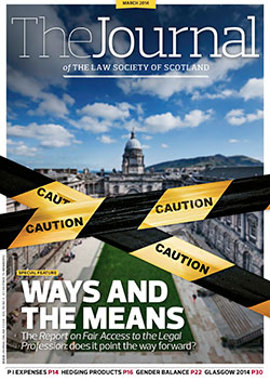Daring to be different

Twenty five years ago, two young partners in a Glasgow firm, Lorne Crerar and Rod McKenzie, took a couple of support staff and converted its business division, which had recently started, into a separate commercial practice. The new start was Harpers, which subsequently took over a niche corporate firm called Macleods, to become Harper Macleod. Today, that offshoot is the fifth largest legal firm in Scotland, with more than 50 partners and around 300 personnel operating out of four Scottish locations, and generates £21 million in turnover, a figure that has grown every year despite several recessions. This year will also see the firm take to the global stage as legal advisers to the Glasgow 2014 Commonwealth Games – a far cry from a new-start operating from a converted sandwich shop.
For chairman Professor Lorne Crerar, the motivation has always been the desire to do things differently. Having become a partner at age 23 in one of Scotland’s oldest law firms, he had already made one lateral move, attracted by Ross Harper’s reputation for innovation, but soon decided court work was not for him – and became convinced that “a different way of serving clients had real potential for business success”.
Strange as it may seem now, Crerar recalls that: “At that time, in the main, clients didn’t get to speak to partners. Most clients dealt with assistants, they got questions rather than answers in response to questions, and it wasn’t a very innovative business environment – there was no alignment of legal services to businesses, in the main, and that was the opportunity we saw.”
Against the odds?
“It can’t be done”, one prominent banker responded to his idea of setting up a commercial firm from scratch – a red rag challenge to the young firm, if any were needed. Crerar, already known as a banking lawyer partly through his teaching interests, chose to target the secondary banking and SME market and began to find his niche. His colleague Rod McKenzie, well known even then on the litigation side, developed a regarded litigation practice and the firm’s initial twin pillars were established.
“Our original mantra was ‘partner-led, innovative and solution driven’,” Crerar continues.“It was wholly down to relationships Rod and I could create with business and individual clients; it was very personal.”
Not that it was all plain sailing, especially after the still-new practice first moved to its present HQ at The Ca’d’oro, in Gordon Street, Glasgow, in 1990. “It was very hard and we didn’t earn much,” Crerar admits, “but I think having austere times is quite a good thing for a young business, on reflection.” The firm’s first major breakthrough came when the practice was instructed to act for a new company in acquiring the former Scottish Coal assets – having taken a typically bold approach to win the work.
“Our return was wholly commensurate on the company being successful in its acquisition, so it came with considerable risk, but it also brought with it considerable opportunity and it was a major step forward for the firm”, Crerar explains. Spotting emerging practice areas has been another key factor. The early 1990s also saw the appearance of the firm’s social housing unit, set up in anticipation of transfers of Scottish Homes properties to registered social landlords; and its sports law division. Harper Macleod has remained pre-eminent in both fields. Soon afterwards, Stirling District Council privatised all of its legal services – the first and only Scottish local authority to do so. The firm won the right to take over the entirety of that work, gaining “a real insight into what was happening in the public sector, and the skills and knowledge to spread our wings a bit”. Today the public sector is a key practice division of Harper Macleod.
Vive la différence
“I think being able to identify future legal need is a really important part of what the leaders of any law firm do,” Crerar comments. Indeed he asserts: “Most everything we try to do is different; almost a weakness is that doing it differently is a reason to do it. I believe we have been pioneers in many aspects of our business from service delivery, legal services marketing, client and employee engagement.”
Crerar is not one to stand still on a personal development level either. In 2000, he took a Harvard programme in service delivery and leadership skills, which he describes as a “transformational experience”. That was both for its Socratic (critical questioning) teaching methods – “I came back to Glasgow University and never taught the same” – and because “Harvard leads the world in leadership skills, and gave me really important insights into how one can develop and lead a business.” So much so that Harper Macleod now has its own Leadership Forum and has sent other partners to Harvard, including its chief executive.
“Leadership has been the critical factor of success”, Crerar asserts. “Lawyers should develop a capacity to lead others in helping their units and the business sustain and grow.”
A place of opportunity
Harvard also helped Crerar develop Harper Macleod’s “employer of choice” philosophy, devised a little more than a decade ago to attract talent to expand beyond the £3 million turnover level. This has four strands:“where you work and the tools you work with, that is, nice offices - not over the top - and great IT”; who you work with: “no one came to work with the firm unless they were interviewed to death, because there are no politics in the firm: we talk about it as a family”; the clients and the work they bring: “we say to anyone coming, expect to be challenged, and want to do interesting, challenging work, for interesting clients”; and finally, the rewards: “If we could deliver financial return in the top 10% of their peer group at every level of the firm and if we were giving them opportunities to advance as we grow, why would our young lawyers want to leave? It was a natural although expensive strategy, but it worked.”
He adds: “A significant number of our partners were once trainees with the firm. Everyone is encouraged to work together, to contribute and succeed. Everyone works hard at Harper Macleod, right up to partners, but they are rewarded for their efforts in every way we can.”
Alert to the market
The firm was one of the first to appoint a non-lawyer chief executive. Martin Darroch, a chartered accountant, was originally appointed finance director. Crerar regards it as natural that if you operate as a business delivering legal services, rather than as lawyers simply “getting together” in order to deliver services, you should have a professional executive led by a chief executive who doesn’t need to have a legal background.
He adds: “In fact it’s preferable he doesn’t. Martin and his executive team are a critical part of our business success.” Crerar’s exposure to the public sector has taught him that “Governance is critical to performance, and there’s lots of evidence that good governance equals good performance.” Harper Macleod’s approach is a management group of five, reporting to the partnership and enabled to make day-to-day decisions. He adds: “We’re very nimble because our decision making process, although accountable, enables the management group to react quickly and appropriately to get things done.”
Buy-in from throughout the firm, however, is critically important. “One thing all the people in our business should know is our strategy for the future,” Crerar insists. “How can you expect colleagues to commit their future to the firm if they don’t have confidence in direction of travel and leadership of the firm? We live in uncertain times, but our management group is ‘in charge of worrying’, releasing our colleagues to pursue the agreed strategic direction of the firm.”
That strategy, notably, is fluid. Crerar says: “We used to have a three-year rolling strategy, but the truth is that, since 2008, the market has been so fast moving it has been difficult to predict year on year, far less three years ahead, so we’re now down to a two-year strategy. A key aspect of that strategy is remaining nimble and agile to market need. It is our view that the legal market is not just evidencing a re-ordering but a revolution. We need, as an organisation, to be able to respond to threat and opportunity quickly.”
Which presumably makes it silly to ask what to expect from Harper Macleod in the next 25 years.“Yes”, Crerar replies. “I don’t know, and no one does, but it won’t be the same. I am confident about the future, however, as change has always in our short history been opportunity.
“However, in facing the very significant uncertainty of the future, you absolutely need to have a financially robust business, a very strong balance sheet, a clear strategy and a very strong brand, because brand will be what matters as new entrants come to the market. And they will.
“I am often asked, is Harper Macleod now the business I thought it would be 25 years ago?
In truth, when embarking on the journey, Rod and I had no idea where it would lead. However, it’s probably fair to say that it has surpassed our best expectations. I also think that, with the people we have and the wider leadership team, we are in great shape to take advantage of the very many opportunities that lie ahead.
“I had hoped, when starting off, that we would become the destination of choice for two groups: clients in our chosen sectors and our fellow lawyers. The evidence shows we are well on our way in that respect.”
Professor Lorne D Crerar: career history
- Founding partner and chairman, Harper Macleod LLP, 1989;
- Chair in Banking Law, University of Glasgow, since 1997; Deputy chairman, Scottish Enterprise Glasgow, 2000-2003;
- Chairman sub group Housing Improvement Task Force which led to creation of the Home Report and Single Survey 2001 – 2003;
- Independent Reviewer of the Lending Code which covers all personal and small business lending in the UK;
- Convener, Standards Commission for Scotland, 2003-07;
- Chairman, Independent Review of Audit, Inspection, Regulation and Complaints Handling in the Public Sector (Crerar Review), July 2006-August 2008; Chairman, Highland & Islands Enterprise, since 2012;
- Fellow of the Chartered Institute of Bankers, June 1999; Chairman, Discipline for Scottish Rugby Union, since 1995; Chairman, Discipline for 6 Nations Ltd, since 1999;
- Author of The Law of Banking in Scotland (2nd ed, 2007).
In this issue
- The role of "attachment" in child custody and contact cases
- No protocol – what expenses?
- Ecocide: a worthy "fifth crime against peace"?
- Mandatory mediation: better for children
- Reservoir safety regulation: a changing landscape
- Reading for pleasure
- Opinion: Mark Hordern
- Book reviews
- Profile
- President's column
- Digital deeds move closer
- Fair access - a fair way to go
- No protocol – what expenses? (1)
- Hedges: not all bad news
- Daring to be different
- Financial planning or wealth management – is there a difference?
- Success in the balance
- Wealth management for business leaders and owners
- Purpose of the protocol
- Actionable data wrongs?
- Land Court: business as usual
- Penalty points
- Scottish Solicitors' Discipline Tribunal
- Fever pitch
- Heritage regained
- All grist to the mill
- Wills: is it OK to act?
- Gongs, dinners and just deserts
- Perils of the home
- Ask Ash
- Scots lawyers debate Union in London
- Public Guardian news roundup
- Law reform roundup
- Personal Injury User Group at your service
- Diary of an innocent in-houser






